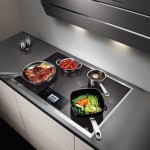Until recently, cookers made up a single whole. The hotplates were combined with the oven until the designers came up with the idea to separate them.
Since the introduction of kitchen appliances on the market, the electric hob has become more and more popular every year. Thanks to a modern control mechanism, a huge number of additional functions, as well as a fashionable design.
Types of kitchen electric hobs

- Dependent - installed above the oven, with which it has a common power supply and control. The advantage of this type can be attributed to the ease in the selection of a set: the same type of panel and oven have a common design, handles, color. The built-in electric hob has a significant disadvantage: if the oven breaks down, the consumer will lose the entire set. In addition, the surface and the oven cannot be separated; you will have to make a choice in favor of the model offered by the manufacturer. Even if some functions are not needed.
- Independent - works independently of the oven. The advantages of this type are obvious: you can combine, choose an expensive hob, as well as a budget-level oven. Or place such a kit in different corners of the kitchen by mounting the oven in the kitchen drawer at the desired height.
Steel, enamel or glass?

When choosing a kitchen electrical panel, pay attention to the material from which it is made.
- The enamel electric hob for the kitchen has a low cost, but it is prone to damage and scratches, it is difficult to clean it from dirt.
- The stainless steel hob is more practical, easier to clean and can withstand heavy loads. But you will have to clean it with special means and often, since even fingerprints remain on the metal.
- Independent glass ceramic hob - an expensive option, but loved by many consumers, thanks to its creative design, touch control, durability. However, such a plate is afraid of impacts, scratches, and may be damaged in the process of careless use. Despite this, glass ceramics are better than enamel and stainless steel in many respects.
TOP 3 best electric hobs
- Electrolux EHH 96340 XK
- Hansa BHEI60130010
- GEFEST SVN 3210
Types of heating elements
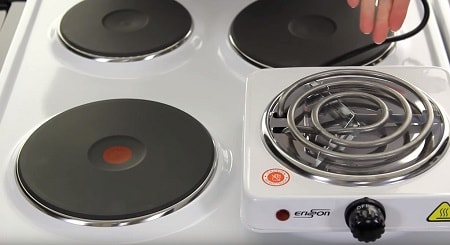
- Cast iron. Budget models with a round hob in the form of "pancakes", which should be chosen because they are unpretentious in maintenance and are suitable for any utensils (except plastic). But over time, they lose their luster, look untidy. In addition, they are energy intensive: they spend a lot of time on heating and cooling (they heat up to 7 minutes, cool down to 30 minutes).
- Halogen. In addition to the spiral, they have a powerful halogen lamp. Such a burner heats up in a second, has a slight inertia.
- Hi-Light-system - common types of heating elements, consist of ribbon-like shades. Reliable, easy to clean.
- Induction. The most advanced and efficient, they are safe because they heat the bottom of the cookware at the point of contact, thanks to magnetic induction. The surface two centimeters from the hotplate remains cold. Provides instant boiling and accurate temperature. Choosing an independent induction hob, it should be noted that it is better for her to purchase special steel dishes with a perfectly flat bottom with a thickness of 4 to 6 mm.
Mechanics or sensor?
By the type of control, kitchen hobs are:
- mechanical;
- sensory.
The touch-sensitive independent electric hob is easy to clean, just wipe it down. Convenient location of various indicators: activation, blocking, activation of an extended zone, memory, additional functions. The recessed touch panel saves space as it is smaller than a mechanical one.
However, the sensor independent plate has one drawback: in the event of a breakdown, it is difficult to find and repair the malfunction.
Characteristics of electric hobs
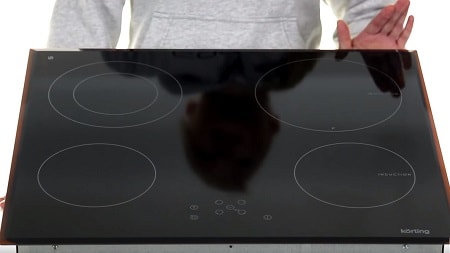
Choosing an independent cooking electric panel for the kitchen is not a problem. There are a great many of them, they vary in shape, size, functionality.
The number of burners and their location depend on the model and type of heating element. The most common are rectangular hobs, but there are also triangular, diamond-shaped, curved hobs that are suitable for any kitchen. The parameters of the hobs also depend on the model.
All modern models have functional characteristics, are equipped with a residual heat indicator, a timer, a self-shutdown device and a control panel lock. A-class energy consumption and power distribution of the front and rear cooking zones make them economical.
Additional functions
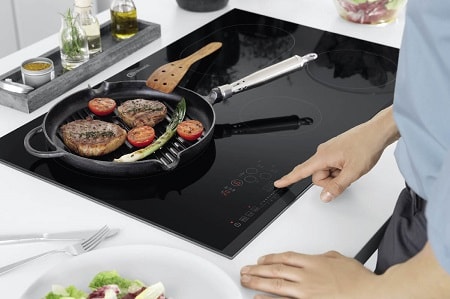
The main difference between an electric kitchen surface and a traditional stove is its functionality. What "chips" does this modern technique have?
- The heating zone is variable: if necessary, an additional sector can be connected to the hotplate.
- Autoboil: the heating power is increased for a while, then returns to the original value. After boiling the liquid, the stove automatically reduces the temperature.
- Autofocus function: an independent hob determines the size of the dishes, if necessary, turns on an additional heating zone.
- Standby mode: in the absence of dishes on the surface, electricity is not wasted.
- Warming function: reheats food in pots, pans, even plates.
- Small burner for the Turk.
- Timer: turns off the hotplates in time.
- Stores a sequence of temperature conditions in memory.
- Shuts down due to liquid spillage on the surface.
- Reads information about the diameter of the cookware: the built-in hob will adjust the heating area to the characteristics of the cookware.
TOP 3 best Bosch electric hobs
- Bosch PKE645B17
- Bosch PKE611D17E
- Bosch PIE631FB1E
Electric hob: features of choice
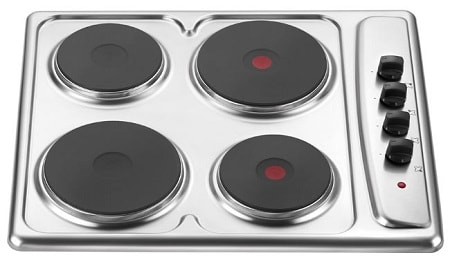
Typically, buyers make choices based on design, color or price.
But there are criteria that also need to be assessed.
- Determine the shape, size of the kitchen surface.
- Think over the design: will the black standard panel be in harmony with the interior, or is it better to opt for a light one.
- The number of heating segments, as well as their placement, is an important factor when choosing a stove. For a small kitchen, it is enough to choose a two-segment panel. An electric hob with four or more burners is suitable for families with children.
- It is necessary to evaluate the parameters of the existing dishes, make sure that large dishes fit optimally on the surface.
- Analysis of functionality will allow you to determine which modes are better to do without, not to overpay for unnecessary characteristics.
Tips for choosing
Those who decide to choose a built-in electrical panel for the kitchen should consider the following:
- The installation of an independent hob is planned in advance. At the repair stage, it is better to take care of the quality of the wiring, since the total power consumption of the burners sometimes reaches 9 kW.
- For such a stove, you need to choose dishes with a flat, flat bottom, the circumference of which is not less than the diameter of the heating segment. Copper or aluminum products are also not suitable, after which traces remain on the surface.
- Saving is a short-sighted decision, since such equipment is bought for long-term use. An independent built-in panel must be functional as well as perspective.

